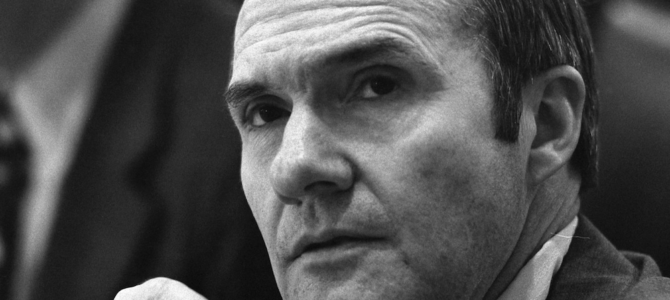
Gen. Brent Scowcroft passed away last week, leaving a legacy of public service that makes him worthy of a place of honor in the American canon of leadership. The late general was a soldier, a scholar, a statesman, a strategist, and a lion of U.S. national security policy.
Scowcroft was at the center of the geopolitical transformations in the latter half of the 20th century. With his steady hand, he helped the United States and its allies navigate the fall of the Soviet Union, the breakup of the Warsaw Pact, and the reunification of Germany in the early 1990s. Without Scowcroft, who knows if the Cold War would have ended without a shot fired?
As new challenges emerged, Scowcroft helped the United States shape the post-Cold War world. When Iraq invaded Kuwait in 1990, Scowcroft assembled an international coalition to expel the invading forces, but counseled restraint against those who wished to march to Baghdad to topple Saddam Hussein.
These were among Scowcroft’s most noteworthy achievements, but his record of devoted, nonpartisan public service extends back decades. His time as an Air Force pilot began in 1947, but after a crash and a broken back, he spent much of his military career as a professor, first at West Point and then at the Air Force Academy. He then served in various staff positions at the Pentagon, rising to become military assistant to President Richard Nixon. In this role, he accompanied Nixon on his historic trip to open relations with the People’s Republic of China in 1972.
Scowcroft’s National Security Legacy
Scowcroft impressed Nixon’s national security adviser and another luminary of 20th-century U.S. foreign policy: Henry Kissinger. Kissinger made Scowcroft his deputy, and despite Kissinger’s difficult demeanor, the two had a close and constructive relationship.
According to Bartholomew Sparrow’s biography of Scowcroft, Kissinger tried directing his notorious temper at his deputy on only one occasion. Kissinger “began yelling at him, standing right up against him, chest to chest.” Scowcroft stood silently. Kissinger finished and said, “Scowcroft, one day I’ll find a way to get to you.” He never did, a testament to Scowcroft’s remarkable courtesy and composure.
Scowcroft has the distinction of being the only person to serve as national security adviser to two presidents, Gerald Ford and George H.W. Bush. In a way, he served in this role for Nixon as well. From September 1973 to November 1975, Kissinger was both national security adviser and secretary of state, leaving his deputy, Scowcroft, to keep the National Security Council (NCS) staff running each day.
Within the national security policy community, Scowcroft is as well known for process as for substance. He established the interagency model for NSC decision-making that each of his successors has emulated. He was recognized as an “honest broker” who fairly represented the views of cabinet secretaries and prepared decisions for the president. He is widely considered to be the most effective person ever to occupy the role and is cited as a model, including by Robert O’Brien, the current national security adviser.
Scowcroft was a legendary mentor. His NSC staff was the farm system for the next generation of U.S. national security officials, and included: Condoleezza Rice, Stephen Hadley, Robert Gates, Paula Dobriansky, Richard Haas, Jane Holl Lute, Nicholas Burns, Daniel Poneman, and many others.
Between and after his stints as national security adviser, Scowcroft continued to have an outsize influence on U.S. foreign and defense policy. In 1983, he chaired President Ronald Reagan’s Commission on Strategic Forces, and his “Scowcroft Report” recommended the robust modernization of America’s nuclear forces.
In the early 2000s, Scowcroft publicly opposed President George W. Bush’s decision to invade Iraq, arguing it would “seriously jeopardize, if not destroy, the global counterterrorist campaign we have undertaken.” His loyalty was to country, not party, and he served as an informal adviser to presidents of both parties, including Barack Obama.
An Example of Humility
While Scowcroft was brilliant, he was not infallible. He had hoped that patient and consistent engagement would moderate the Chinese Communist Party. After the Tiananmen Square massacre, he traveled to Beijing in an attempt to mend the relationship. He also opposed NATO expansion, fearing it would be too provocative to Russia.
Scowcroft had the capacity to admit the rare occasions when he was wrong, however, and later privately acknowledged that NATO expansion had worked out better than he expected. Indeed, this reflects Scowcroft’s most admirable quality: humility. Despite his great intellect and accomplishments, Scowcroft was a rare breed in Washington, D.C.; he had very little ego and was liked by just about everyone.
We are most familiar with Scowcroft because of his contributions to our place of work. As chairman of the Atlantic Council think tank in the mid-2000s, Scowcroft helped save the institution. He directed that it broaden its focus beyond transatlantic issues and go global. As a result, it has been among the fastest-growing foreign policy think tanks in Washington over the past decade and a half.
Scowcroft is also the namesake for the Atlantic Council’s Scowcroft Center for Strategy and Security. He argued that many outfits in Washington focus on short-term news-cycle and policy issues, but too few step back, look at the big picture, and do real strategy. He directed us to distinguish ourselves by developing sustainable, nonpartisan strategies to address the most important challenges facing the United States and its allies. Through our work at the center, we seek to honor his legacy of service every day.
Political scientists are loath to give too much weight to the great men and women of history, preferring instead to emphasize the broader structural forces at work. Scowcroft’s life and legacy are an affront to this view of international relations, for there is little doubt that he left his distinct mark on a world transformed.









